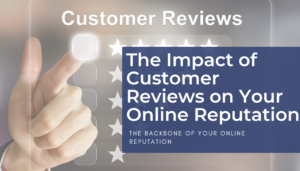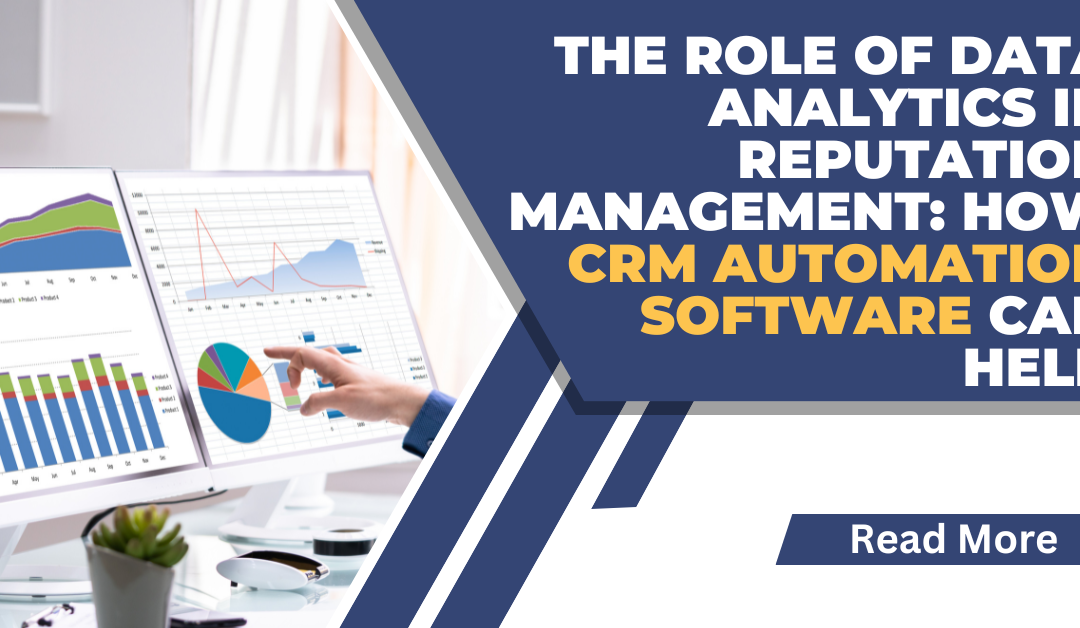In today’s digital age, a business’s reputation can make or break its success. With the proliferation of online reviews, social media mentions, and customer feedback, reputation management has become a critical aspect of business strategy. The ability to effectively manage and protect a company’s reputation has become more complex and challenging than ever before. However, data analytics, particularly through CRM (Customer Relationship Management) automation software, can play a pivotal role in helping businesses navigate the intricacies of reputation management.
Reputation management encompasses the strategies and techniques used by businesses to actively monitor, analyze, and influence their reputation online. It involves managing online reviews, social media conversations, feedback from customers, and other forms of communication that can impact a company’s image. The power of reputation cannot be understated. It directly affects a business’s credibility, customer trust, and ultimately its bottom line.
The digital landscape has significantly changed how businesses manage their reputation. In the era of data-driven decision-making, leveraging data analytics is crucial for businesses to gain insights and make informed decisions. This is where CRM automation software comes into play. CRM automation software is designed to collect, analyze, and interpret vast amounts of data from various sources. These sources include customer interactions, social media, and other online platforms. By utilizing CRM automation software, businesses can harness the power of data analytics to effectively manage their reputation and gain a competitive edge in the market.
The purpose of this article is to explore the role of data analytics in reputation management and highlight how CRM automation software can aid businesses in this endeavor. We will delve into the fundamentals of data analytics, explain the significance of CRM automation software, discuss how data analytics can be leveraged for reputation management, and provide best practices for businesses to overcome challenges and achieve success in this domain. By the end of this article, businesses will have a better understanding of the potential of data analytics and CRM automation software in managing and protecting their reputation in today’s data-driven business landscape.
Understanding Data Analytics
Data analytics is the practice of examining, cleaning, transforming, and interpreting data to extract meaningful insights and support decision-making. In the context of reputation management, data analytics involves the systematic analysis of data related to customer feedback, online reviews, social media mentions, and other relevant information to gain a deeper understanding of a business’s reputation.
Data analytics provides businesses with the ability to turn raw data into valuable insights. Through various techniques such as descriptive, diagnostic, predictive, and prescriptive analytics, businesses can uncover patterns, trends, and correlations in data that can inform reputation management strategies.
Types of data used in reputation management can include customer feedback obtained from surveys, reviews from online platforms such as Google Reviews or Yelp, social media mentions on platforms like Facebook, Twitter, and Instagram, as well as other relevant data sources. By collecting and analyzing data from multiple sources, businesses can gain a comprehensive view of their reputation. They are also able to identify potential issues and uncover opportunities for improvement.
The benefits of using data analytics in reputation management are numerous. For instance, data analytics can provide businesses with real-time insights, allowing them to promptly detect and address any emerging issues. Data analytics can also help in identifying patterns and trends in customer feedback, enabling businesses to understand customer sentiment and preferences more effectively. Additionally, data analytics can provide businesses with data-driven recommendations for reputation management strategies. This leads to more informed decision-making and better outcomes.
To effectively utilize data analytics in reputation management, businesses need reliable tools that can collect, analyze, and interpret data. This is where CRM automation software comes into play. CRM automation software is designed to streamline and automate various customer-related tasks. These tasks include data collection, analysis, and interpretation. This makes it a valuable tool for businesses seeking to leverage data analytics for reputation management.
To sum up, data analytics is a crucial component of effective reputation management. By collecting, analyzing, and interpreting data related to customer feedback, online reviews, social media mentions, and other relevant sources, businesses can gain valuable insights to inform their reputation management strategies. CRM automation software, with its ability to collect, analyze, and interpret data, plays a pivotal role in facilitating data-driven reputation management strategies. The next section will explore the role of CRM automation software in more detail and how it aids businesses in managing their reputation.
The Role of CRM Automation Software in Reputation Management
CRM automation software is a powerful tool that can assist businesses in managing their reputation effectively. CRM stands for Customer Relationship Management, and CRM automation software is designed to streamline and automate various customer-related tasks, including data collection, analysis, and interpretation. Here are some key ways in which CRM automation software can play a vital role in reputation management:
Data Collection:
CRM automation software allows businesses to collect data from various sources. Sources include customer interactions, online reviews, social media mentions, and other relevant data points. This data can be automatically captured, organized, and stored in a centralized database, making it easily accessible for analysis and interpretation. By automating the data collection process, CRM automation software ensures that businesses have a comprehensive and up-to-date repository of data to inform their reputation management strategies.
Data Analysis:
CRM automation software comes with built-in analytics tools that enable businesses to analyze data and uncover valuable insights. These analytics tools can help identify patterns, trends, and correlations in data that can provide insights into customer sentiment, preferences, and behavior. By leveraging the data analytics capabilities of CRM automation software, businesses can gain a deeper understanding of their reputation and make data-driven decisions to manage it effectively.
Sentiment Analysis:
CRM automation software often includes sentiment analysis features that allow businesses to automatically analyze the sentiment expressed in customer feedback, online reviews, and social media mentions. Sentiment analysis can help identify positive, negative, or neutral sentiments towards a business or its products/services. This information can be invaluable in understanding how customers perceive the business and its reputation. It’s also valuable in identifying areas that may require attention or improvement.
Automated Alerts:
CRM automation software can be configured to send automated alerts to businesses when certain events or triggers occur. For example, businesses can set up alerts to be notified when they receive a negative review or when their brand is mentioned in a social media post with a high engagement rate. These alerts can help businesses respond promptly to any emerging issues and take proactive steps to manage their reputation effectively.
Reporting and Insights:
CRM automation software provides businesses with the ability to generate customized reports and dashboards that provide a visual representation of their reputation data. These reports can provide valuable insights and metrics related to customer feedback, online reviews, social media mentions, and other relevant data points. This allows businesses to monitor their reputation performance over time, track progress, and identify areas for improvement.
Integration with Communication Channels:
Many CRM automation software integrates with various communication channels, such as email, social media, and chat, allowing businesses to manage customer interactions and feedback from a single platform. This integration can streamline the process of managing reputation-related communication, making it more efficient and effective.
Workflow Automation:
CRM automation software often includes workflow automation features that can help businesses streamline their reputation management processes. For example, businesses can set up automated workflows to automatically respond to customer reviews, escalate issues to appropriate team members, and track progress on reputation management tasks. This can save time and effort while ensuring that reputation management tasks are handled consistently and efficiently.
To summarize, CRM automation software plays a crucial role in reputation management. It provides businesses with the tools and capabilities to collect, analyze, and interpret data related to customer feedback, online reviews, social media mentions, and other relevant sources. By automating these processes, businesses can gain valuable insights, monitor their reputation in real-time, and make data-driven decisions to manage their reputation. The next section will discuss how businesses can leverage CRM automation software and data analytics for successful reputation management practices.
Leveraging CRM Automation Software and Data Analytics for Successful Reputation Management
The combination of CRM automation software and data analytics can provide businesses with a powerful toolkit for successful reputation management. Here are some practical ways businesses can leverage CRM automation software and data analytics to effectively manage their reputation:
Real-time Monitoring:
CRM automation software allows businesses to monitor their reputation in real-time by automatically collecting and analyzing data from various sources. This enables businesses to quickly identify emerging issues, such as negative reviews, social media mentions, or customer complaints. This gives businesses time to respond promptly to address them before they escalate. Real-time monitoring can help prevent potential reputation crises and allow businesses to take proactive steps to maintain a positive reputation.
Proactive Reputation Management:
With CRM automation software, businesses can proactively manage their reputation by using data analytics to identify areas that require attention. For example, sentiment analysis can help identify trends in customer feedback, online reviews, and social media mentions. This allows businesses to proactively address any negative sentiment or issues. By leveraging data analytics, businesses can identify patterns and trends early on, and take proactive measures to address them before they impact their reputation negatively.
Personalized Communication:
CRM automation software allows businesses to communicate with their customers in a personalized and targeted manner. By analyzing customer data, businesses can gain insights into customer preferences, interests, and behavior, and tailor their communication accordingly. Personalized communication can help build a positive relationship with customers, foster loyalty, and mitigate any potential reputation issues. CRM automation software can also automate communication workflows. Workflows such as sending thank you notes or requesting reviews ensure consistent and timely communication with customers.
Strategic Decision-Making:
Data analytics provided by CRM automation software can inform strategic decision-making related to reputation management. By analyzing data on customer feedback, reviews, mentions, and other relevant data points, businesses can identify trends that can inform strategic decisions. For example, businesses can identify recurring issues or areas that receive positive feedback and leverage them to improve their reputation. Data-driven decision-making can help businesses make informed choices about reputation management strategies, allocate resources effectively, and prioritize actions that will have the greatest impact on their reputation.
Performance Tracking and Reporting:
CRM automation software provides businesses with the ability to track and measure the performance of their reputation management efforts. Customized reports and dashboards can provide insights into key metrics, such as customer sentiment, review ratings, social media mentions, and response times. This allows businesses to monitor progress and measure the effectiveness of their reputation management strategies. This data can also be used to demonstrate the impact of reputation management efforts to stakeholders and make data-driven adjustments to strategies.
Integration with Other Tools:
CRM automation software can integrate with other tools and platforms, such as social media management tools, review management platforms, and customer feedback platforms, to streamline reputation management processes. This integration allows businesses to centralize their reputation management efforts and ensure consistent and coordinated actions across various channels. For example, businesses can automatically collect and analyze data from social media platforms, respond to online reviews, and manage customer feedback, all within the CRM automation software, making reputation management more efficient and effective.
In summary, CRM automation software and data analytics play a critical role in effective reputation management. By leveraging the capabilities of CRM automation software and utilizing data analytics, businesses can monitor their reputation in real-time. Business can also proactively manage their reputation, personalize communication, make strategic decisions, track performance, and streamline processes. This integrated approach can help businesses build and maintain a positive reputation, foster customer trust, and drive business success.
Overcoming Challenges and Best Practices
While data analytics and CRM automation software can greatly benefit businesses in reputation management, there are also challenges. Here are some common challenges and best practices to consider:
Data Quality and Accuracy:
One challenge in data analytics is ensuring the quality and accuracy of the data used for analysis. Data can come from various sources. It’s crucial to ensure that the data used for reputation management is reliable, up-to-date, and accurate. Best practices include implementing data validation processes, regularly monitoring data quality, and leveraging data cleansing techniques to maintain data integrity.
Privacy and Security:
Data privacy and security are critical concerns in reputation management, as businesses handle sensitive customer data. It’s important to comply with data protection regulations, such as GDPR, and implement robust security measures to safeguard customer data. Best practices include encrypting data, restricting access to authorized personnel, and implementing data breach response plans.
Analyzing Large Data Sets:
Analyzing large data sets can be challenging and time-consuming. Businesses may struggle with processing and analyzing vast amounts of data collected from various sources. Best practices include leveraging data visualization tools, utilizing machine learning algorithms for automated analysis, and prioritizing relevant data for analysis to focus on actionable insights.
Actionable Insights and Decision-Making:
Another challenge is translating data into actionable insights and making informed decisions. Simply collecting and analyzing data is not enough. Businesses need to be able to take actionable steps based on the insights gained from data analytics. Best practices include setting clear goals and objectives, aligning data analysis with business objectives, and having a well-defined process for turning insights into action.
Proactive Reputation Management:
Reputation management requires proactive monitoring and addressing issues in real-time. Businesses need to be proactive in identifying and addressing potential reputation risks before they escalate into larger problems. Best practices include setting up real-time monitoring systems, implementing automated alerts for negative mentions, and establishing a rapid response plan to manage reputation risks in a timely manner.
Continuous Improvement:
Reputation management is an ongoing process that requires continuous improvement. Businesses should constantly review and refine their reputation management strategies based on data insights and feedback. Best practices include regularly monitoring and analyzing data, soliciting and incorporating customer feedback, and continuously optimizing reputation management processes to adapt to changing business needs.
To sum up, overcoming challenges and implementing best practices is crucial for effectively leveraging data analytics and CRM automation software. By ensuring data quality and accuracy, prioritizing data privacy and security, analyzing large data sets efficiently, translating insights into actionable steps, proactively managing reputation risks, and continuously improving reputation management processes, businesses can optimize their reputation management strategies and achieve positive results.
Final Thoughts
In today’s digital landscape, reputation management has become a critical aspect of business success. The role of data analytics in reputation management cannot be overstated. CRM automation software, such as DarkSky Digital’s LeadGrowth CRM system, can be a valuable tool in this process. By leveraging data analytics and automation, businesses can gain actionable insights, streamline their processes, and proactively manage their online reputation.
DarkSky Digital’s LeadGrowth CRM system offers a comprehensive solution for reputation management. It allows businesses to collect, analyze, and act on customer data in real-time. With its advanced features like automated data collection, and real-time monitoring, businesses can quickly identify and address potential reputation risks. Businesses can also track customer sentiment, and make informed decisions to protect and enhance their reputation.
The integration of data analytics and a CRM automation software, such as DarkSky Digital’s LeadGrowth CRM system, can significantly enhance reputation management efforts for businesses. By overcoming challenges related to data quality, privacy, and continuous improvement, businesses can effectively manage their reputation and achieve positive results.
If you’re looking to optimize your reputation management strategies and harness the power of data analytics and CRM automation, it’s time to consider DarkSky Digital’s LeadGrowth CRM system. Take action today and empower your business with the tools and insights needed to effectively manage your online reputation and drive business success. Contact DarkSky Digital to learn more about how LeadGrowth CRM can help your business excel in reputation management.
FOLLOW US ON SOCIAL MEDIA:
READ MORE OF OUR LATEST BLOG POSTS HERE:
- Understanding the Basics of Pay-Per-Click Advertising: A Beginner’s Guide

- 5 Types of Content Every Marketer Should Know About

- The Impact of Customer Reviews on Your Online Reputation

- Measuring the ROI of Your Social Media Marketing Campaign: Unraveling the Secrets to Digital Success

- Content Marketing vs. Traditional Advertising: Which is More Effective?

- Title: The Future of SEO: Unlocking the Secrets to Digital Success


